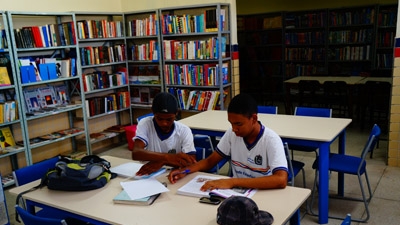Challenge
Despite recent relatively fast economic growth, Pernambuco remains the 8th poorest state in Brazil (out of 26 states), and there remain large socioeconomic disparities within the state. It is one of the most vulnerable states to natural disasters (droughts and flooding) and social hazards (disease and crime). Moreover, unemployment is higher in the rural interior of the state, where recent industrial expansion has not reached. By comparison, the Metropolitan Area of Recife is a relatively affluent city on the east coast. In 2009, the student enrollment rate (ages 15-17) at secondary schools in Recife was 50 percent and 33 percent in the interior. Household access to water in Recife was 89 percent and 66 percent in the interior.
Solution
This Expanding Opportunities Development Policy Loan (DPL) supported the Government of Pernambuco’s ongoing Development Plan, which prioritizes three strategic areas of intervention:
- Improving the quality of life through ensuring public services delivery.
- Expanding opportunities for productive inclusion and equity.
- Enhancing the capacity of the state’s public administration to generate policy results for the population.
The DPL provided technical and financial support to improve the quality of education, provide better water security and disaster risk management, support gender inclusion and job creation opportunities, and increase public administration capacity.
An integral aspect of the agenda involved focusing the quality of life and expanding opportunities in the interior, given the high correlation of regional inequities and inequities in other dimensions.
Results
The project helped the Government to achieve results in all three priority policy areas of the State’s Development Plan.
Improving the quality of life:
- Increased by 185 percent from 2010 to 2013 the number of secondary students enrolled in schools receiving more hours of instruction per week.
- Increased by 24,059 students enrolled in integral and semi-integral secondary schools from 2011 to 2013
- Expanded water-rights by 58 percent from 2010 to 2013, established a water users’ cadaster, and formalized procedures for a flood risk early warning system covering over 3.6 million people.
Expanding opportunities for productive inclusion and equity:
- Enrolled 13,687 additional students from 2010 to 2013 in professional education schools, 5,367 of which live outside of the mar
- Increased the number of public employees trained on gender issues from 600 in 2010 to over 2,000 by 2013.
- Increased funding for SMEs and rural producers, from 3 in 2010 to 19 in 2013.
Enhancing the capacity of the state’s public administration:
- Reduced by 20 percent budgetary revisions.
- Published systematic online a Social Management Report starting in 2011
Bank Group Contribution
The Bank provided US$500 million as a single-tranche DPL to the State of Pernambuco in order to consolidate the impact of actions requiring specific investments. Additionally, the Bank contributed US$690,000 in resources in the form of technical assistance to prepare and supervise the Project.
Partners
The Bank worked in strong partnership with the Pernambuco State Government. The State’s Secretary of Planning and Management (SEPLAG) acted as the implementation agency and coordinated with other secretariats involved. These secretariats included the Development Agency of the State of Pernambuco (AGEFEPE ) in promoting the economic and social development of SMEs and rural producers, the Agency for Water and Climate (APAC) in expanding water security and developing the disaster risk management system, and the Women’s Secretariat (SecMulher) in providing public employees with gender training. Additionally, the Management Institute, established within SEPLAG, was responsible overseeing the promotion of efficiency and transparency in public administration.
Moving Forward
In 2013 the Bank approved a follow-up Development Policy Loan to the State of Pernambuco. The second loan builds upon the reforms supported by this DPL to assist the Government of Pernambuco in its strategy to strengthen the design, implementation, monitoring and evaluation of policies and programs aimed at promoting sustained growth and improved economic opportunities for the poor, consolidating public sector management innovations, preventing crime and violence, and reducing the burden associated with chronic diseases.
Beneficiaries
In addition to the State at large through public administration reforms, this project benefits 2.6 million citizens being covered by a newly created national disaster alert system, 104,000 secondary students receiving higher quality education, 2,000 public employees receiving gender training, and 19 SMEs receiving financing and/or training contributing to local supply chains.

